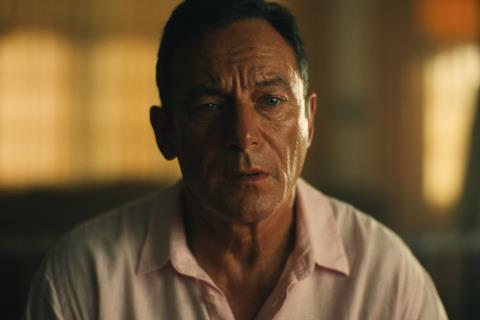Jason Isaacs is very happy being “the guy from…” Whenever a member of the public approaches the Liverpool-born actor, he plays a guessing game with himself as to why they recognise him.
To millennials, he is usually the guy from The OA, Brit Marling and Zal Batmanglij’s Netflix fantasy series. To others, he is the guy from Star Trek: Discovery. And, for a long time, to children especially, he was the guy from the Harry Potter films, having brought derisive panache to the villainous role of Lucius Malfoy. But, he insists modestly, “it’s nice to be the guy from anything”. Now, more than anything, he is the guy from The White Lotus.
Mike White’s hotel-hopping satire has, across three seasons, earned a reputation for taking quietly talented character actors and thrusting them into the heart of popular discourse. Now it appears to be Isaacs’ turn, following his portrayal of North Carolinian financier Tim Ratliff, who spends his entire family holiday at a Thai wellness retreat secretly digesting the news that his business is in ruins and he faces prosecution for corporate malfeasance. It has been described as a ‘renaissance’ for Isaacs, now 36 years into his career, but he finds that term “a bit odd”.
“You trundle away, and I’ve never stopped getting interesting parts,” he says. “The White Lotus might mean I’m in more articles and on more podcasts, but it doesn’t affect my daily life.”
One might forgive Isaacs for becoming jaded by all the attention he has drawn since the show’s third season debuted on HBO Max, but he continues to welcome it with articulate enthusiasm.
“You don’t often get to be in things of this quality that have this impact on people and provide this much pleasure and provocation, and conversation and community,” he says when Screen meets him in late May – about eight weeks after the final episode aired. “This has resonated not just in England and America, where I would imagine it would do, but all over the world – which is a tribute to Mike’s ability to mine the depths and heights of human behaviour. When you write something that is specific and truthful and reflects human behaviour, it’s universal.”
Fear factor
Isaacs is still a little surprised that he was even considered for the role. Executive producer David Bernad thought of the actor after catching his bluff-Yorkshireman take on Soviet Field Marshal Zhukov in Armando Iannucci’s The Death Of Stalin.
This still mystifies Isaacs. “God only knows what Zhukov and Tim Ratliff have in common,” says Isaacs. He also confesses to feeling nervous about taking it on, especially after reading the script and noting that Ratliff’s suffering is almost entirely internal, heavily blanketed by liberal doses of lorazepam.
“I wasn’t sure I had the ability to bring all that complication to an audience when I didn’t have any words, and that I wouldn’t just look like an extra from a Cheech and Chong movie – you know, this guy zonked out of his head. Not only that, it was clear Mike hadn’t written the family twigging to what I was doing. So I couldn’t be falling all over the place. I worried I would be the dullest person that’s ever been in The White Lotus.”

He also wondered if he would be able to take himself to a place where Tim ultimately resolves to kill not only himself but also his family, as a twisted act of mercy. “I’d seen seasons one and two, and then I had this thing to pull off, which is so much more extreme and dangerously melodramatic than it seemed to me anyone else had done. I didn’t want to be the guy that brought the whole ship down.”
But, he concluded, “that kind of fear is exactly what, as an actor, you run towards. So it was both terrifying and exciting to dive into it.”
Besides, he had an invaluable ally in White. “A lot has been written about how brilliant he is as a writer, but nobody talks about him as a director,” says Isaacs. “He creates an atmosphere on set that is unlike any I’ve been around. He’s behind the monitor, shrieking with laughter, often at some of the darkest and sickest things. And he holds it all very loosely, which might make a casual observer think he’s not in control, but he’s absolutely in control of everything.
“He hands suggestions to you so delicately, they feel like soap bubbles, but actually they’re solid gold,” continues Isaacs. “And if you don’t just take his suggestions, and also perform them verbatim – which he would never insist on – then you’re a fool, because he’s a magnificent actor as well. He could play any of our parts better than we can.”
The shoot was a challenge, with the production spending the best part of six months amid the tropical heat of Thailand. “It was insanely hot, with mosquitoes and snakes and frogs and all that stuff,” recalls Isaacs.
Then there are the rumours of behind-the-scenes drama, for which Isaacs himself feels partly responsible. “I got myself in a little bit of trouble telling people that it wasn’t all fun, and there were all the normal things that happen when a village decamps somewhere for the best part of a year. And that just set off a huge frenzy of people trying to unpick our friendships and relationships with each other. But all I was trying to say was, don’t think that we were sitting by a pool sipping cocktails. Some of these conditions were ludicrously difficult to film in.”
Even if he does not agree with the ‘renaissance’ narrative, it is hard to deny The White Lotus represents a new peak for Isaacs, following his Hollywood breakthrough in 2000 as the cold-hearted English colonel opposite Mel Gibson in The Patriot, and of course his platinum-haired villain in Harry Potter. Yet, despite such successes, he has always seen himself as an outsider.
“I felt like I had a temporary pass,” he says. “If I’m briefly allowed behind the velvet rope somewhere, I know I’m going to get kicked out any minute. And that’s fine, because it’s where I’m comfortable. I think I’m an actor because I’ve never felt I belonged anywhere.”
Television, he asserts, has in the long run been far kinder to him than cinema, particularly after the failure of PJ Hogan’s Peter Pan movie “killed” his burgeoning Hollywood film career in 2003. “The world of television opened up to me,” he explains. It started with a 2004 guest spot on The West Wing, then a lead role from 2006 in crime series Brotherhood, and lauded performances as actors Harry H Corbett and Cary Grant in, respectively, TV movie The Curse Of Steptoe (2008) and miniseries Archie (2023).
“You’re in people’s front rooms, so you affect them very differently,” muses Isaacs. “Your head is the size of a head. That’s how television sets were designed, so that a close-up is like somebody sitting in your armchair. When people watch films, they know they’re watching a story. When people watch TV, it feels much more real to them.”
Small-screen work has also afforded him the opportunity to move behind the camera. “To produce and direct and be involved in the creative process and all that stuff. It’s quite nice to be able to sit at the grown-ups table occasionally.”
Indie productions
Even so, a quirk of scheduling means Isaacs will be seen much more on the big screen in the coming months. He has a string of incoming independent productions, including Honey Bunch and the Sean Penn-produced Words Of War.

These join the recently released Shakespeare reimagining Juliet & Romeo and Marianne Elliott’s The Salt Path, in which he appears as another man who suddenly loses everything. “But how differently they react [from The White Lotus’s Ratliff] tells you so much about who they are and the world around them,” points out Isaacs.
Aside from lining up some “low-budget films with my friends… though I shouldn’t say what they are yet”, Isaacs has also landed the role of manor-born patriarch Mr Pounds in Zachary Wigon’s Victorian Psycho – notably the first script he has said yes to since The White Lotus.
“I had to stop thinking that the next thing will be White Lotus-y – and this couldn’t be less White Lotus-y,” he says. “I enjoyed reading it, and I went to have a coffee with Zac, and he seemed very cool and fun.
“Sometimes I turn down work for a long period, and then I take something and I’m on the set, and look in the mirror and say, ‘You fucking idiot. Remember this? You love coming to work. Why do you think that everybody’s watching you and marking your scorecard? It doesn’t matter. Just do things you think are fun.’”


























No comments yet